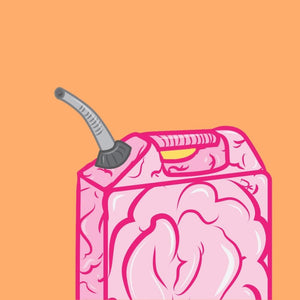Your brain works hard, and needs fueled and nourished just like the rest of your body (arguably even more!). Ensuring that your brain is in top shape can help support the wellness of your entire body from the top-down.
There are plenty of ways to fuel the brain, both directly and indirectly. So, let’s look at some of the most effective and simple ways to stimulate the mind and give your brain the physical and metaphorical fuel your brain needs to thrive!
What Does It Mean To Fuel the Brain?
Your brain uses energy to keep your body moving, grooving, and doing everything it’s supposed to. And while the energy needed to power your noggin is only about the same as a household light bulb, you still need to make sure you’re supplying it with enough power to tackle its very long list of responsibilities.
The brain uses 10 times more energy than the rest of the body, mostly because of the amount of processing the brain does every second of every day. Neurons in the brain are constantly signaling to one another, allowing you to remember information, move your limbs, digest your food, and probably anything else you can think of (including the thinking you do to think of more stuff).
So if our metaphor is that your brain needs fuel like a car needs gas, what exactly is brain fuel?
Lactate, which is a by-product of glucose, is one of the major nutrients that the brain needs to function. This is a compound that is created during physical exercise. But fueling the brain is also all about feeding your body the right nutrients and minerals necessary to ensure that it’s performing at the peak of its function.
Food and Nutrition
The cells in your body and brain are constantly fighting off oxidative stress. Oxidative stress is thought to be the reason that people die of “old age,” since over time, it can get to a point where cells are getting damaged more quickly than they can be repaired. If this happens quickly in the brain, it can lead to neurodegenerative disorders like Alzheimer’s.
Foods that are high in antioxidants can work to combat oxidative stress. High-antioxidant foods include vegetables, fruits, potatoes, and avocados.
One of the most direct ways to fuel the brain is by fueling your body with the right nutrients through healthy meals and the right snacks. And while healthy eating helps stave off issues like high blood pressure or cholesterol, it can also work to keep your mind sharp.
There are also ingredients that have been shown to support brain health while also bringing holistic benefits to the rest of the body. Lion’s mane, for instance, is a Japanese nootropic that supports brain health while also being a potent antioxidant, while ashwagandha is a full-spectrum extract that also fuels your brain while also helping to support your body’s natural stress management system.
But where do you even get these kinds of ingredients? Turns out – you just need to take a few bites of a delicious protein bar made for your brain.
MOSH is the protein bar for your brain, made with ingredients that support brain health. Couple that with 12g of grass-fed whey protein and you’ve got yourself the perfect midday snack to fight cravings and enhance your mental focus.
Exercise
While you’re naturally going to be expelling a lot of energy when you exercise, physical activity is one of the best ways to fuel your brain and fight back against cell aging. In fact, one study found that cognitive decline is almost twice as common among adults who are physically inactive compared to those who regularly get physical activity.
Regular exercise can tone your muscles, reinforce your heart health, and support a healthy weight, making you feel healthier overall in many different ways.
Exercise can also improve memory and boost your mood. It’s just an overall fantastic activity for your overall health, and it doesn’t need to feel like a chore, either.
If the thought of bicep curls makes you want to curl into a ball and cry, know that you can reap the benefits of brain-fueling physical activity outside of the gym. Going on a hike with friends, taking a group fitness class, going swimming, or playing a sport are all fantastic ways to feel the positive effects of exercise without the stress of going to the gym.
Brain Games and Mental Stimulation
Crosswords and word searches are a lot more than just page-fillers on the backs of cereal boxes. These mind games are also a great way to keep your brain sharp and stimulated at all points of life.
While doing a crossword every day might not necessarily help fire off your neurons in a new and special way, you can keep your brain fueled by exposing it to new stimuli as often as possible. For instance, if you’ve never played sudoku, giving it a go is a great way for your brain to start learning new information and exercise its ability to adapt to new challenges.
Learning a new language or playing an instrument are great ways to keep your brain stimulated, as are playing new brain games or teaching yourself a new hobby. Plus, these activities can be shared with friends to give you the benefits of social interaction at the same time.
Sleep and Relaxation
Your brain needs time to rest and recuperate after a long day of coordinating every movement, thought, and breath you’ve made. And while sleep might seem like a time when your brain completely shuts off to rest, it’s actually a time when your brain is super active.
consistently getting enough high-quality sleep is associated with better moods, better focus, and decreased risk of disorders including diabetes, high blood pressure, and depression. That’s why it’s super important to try to get at least 7-9 hours every single night in order for proper functioning.
Additionally, sleep is a way for your brain to remove toxins that are basically byproducts of what your brain does while it's awake. This can help reduce the risk of harmful plaques from forming in the future, which might otherwise lead to cognitive decline.
If you’re having trouble falling asleep because of the stressors of everyday life, you’re not alone. You can try to feel more relaxed by taking some time for self-care before bed and establishing a regular routine.
Run a nice hot bath with some essential oils for added relief, or curl up with a great book every night before you turn in. Do whatever makes you feel calm.
Hang With Friends
We humans are social creatures at heart. And that means when you hang out with friends and family, you’re actually doing a really great thing to stimulate your brain.
Socialization can actually lower your risk of dementia by promoting self-esteem and improving feelings of independence. It also promotes a sense of safety, belonging, and security that is unmatched by most other forms of brain fuel.
Having a solid support system is important at any time in life, and you can combine the benefits of social interaction with the benefits of other forms of brain fuel. Bring your friends with you to a fitness class, or go out to lunch at a healthy smoothie bar to combine two benefits in one fell swoop.
Summary
With just a few intentional changes to your routine, you can support your health without too much effort at all.
The things you eat and drink every day are the main forms of literal fuel to the brain, and should include vegetables and fruits that are high in antioxidants and can help support brain health. Similarly, physical activity supports cognitive health to make you feel good both inside and out.
It’s also important to get the right amount of sleep to allow your brain time to rest, fueling it with restorative sleep. When you’re fully rested and ready to rock and roll, train your brain with some brain games, or go hang out with some friends and go on new adventures to keep your brain exposed to new environments and scenarios.
Before you head out, make sure you bring along a MOSH bar to help fuel your mind and body along the way. Order your trial pack today here!
Sources:
Physical Activity Boosts Brain Health | DNPAO | CDC
Brain Basics: Understanding Sleep | National Institute of Neurological Disorders and Stroke
Health Benefits of Social Interaction | Mercy Medical Center








